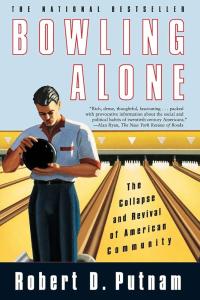The title for this post comes from Camper Van Beethoven’s classic, prescient song, “Take the Skinheads Bowling“:
That’s from 1985 — a full 10 years before Robert Putnam’s essay “Bowling Alone,” which he expanded into his influential 2000 book about “America’s Declining Social Capital.”
 Here we are a quarter century later and Putnam’s argument is back in The Discourse as we face an apparent “crisis of masculinity” or “male loneliness epidemic” or whatever it is that seems to be causing a growing chunk of young white men in America to be acting (and voting) in more anti-social ways. Here’s Erik Loomis discussing a recent New York Times report on this subject and on progressive groups attempting to reach the young male audience now dominated by the Douchebag-Creeper Axis of Tates, Rogans, Walshes, and theobros.
Here we are a quarter century later and Putnam’s argument is back in The Discourse as we face an apparent “crisis of masculinity” or “male loneliness epidemic” or whatever it is that seems to be causing a growing chunk of young white men in America to be acting (and voting) in more anti-social ways. Here’s Erik Loomis discussing a recent New York Times report on this subject and on progressive groups attempting to reach the young male audience now dominated by the Douchebag-Creeper Axis of Tates, Rogans, Walshes, and theobros.
I’m always skeptical of outreach efforts referred to as “outreach efforts.” Whether it was a political campaign, a political party, or a local church youth group, I’ve just never seen one that wasn’t in some way just a little bit … off. It always seems there’s something off-putting about “outreach.” Maybe CVB’s approach is best — just accepting the absurdity and awkwardness of the “outreach” and leaning into it. Take the skinheads bowling, take them bowling.
To repeat something I wrote a while back on Blue Sky, I don’t think there’s any single, magic-bullet solution to countering the Douchebag-Creeper influence on millions of young American men. Unless maybe it’s community theater.
I mean, no, I don’t know what to do about 20 million aggrieved and anti-social young men. But what to do about just one such young man? I’d cast him in a community-theater production of Oklahoma.
One way to stop a guy from turning into Jud Fry is to cast him as Jud Fry. Or Will Parker. Or, heck, if he can sing, as Curly (Oklahoma itself suggests a kind of community response to Jud Fry types, but I think that’s more about the inevitable trajectory of young men who become douche-pilled creepers than it is a prescriptive action plan.)
I picked Oklahoma here because it’s one of those big musicals with a ginormous cast of townsfolk and chorus parts. They’ll need to cast enough men to pull off “The Farmer and the Cow Man,” so if our disaffected young man shows up, he’s getting a part. He will literally have a part to play and will become a part of something — part of a project, part of a group, part of a community working together toward a common goal.
That community will help to socialize our anti-social young man. They’ll have to, otherwise he’ll never learn his lines or his blocking or his choreography. So he’s going to spend weeks around an intergenerational group of men with whom he’ll be working directly, seeing a range of examples and counter-examples up close.
And he’ll also be spending those weeks around a large intergenerational group of women. Yes, the single-straight-girl-to-straight-guy ratio of community theater may help lure our young man away from the resentful crouch of anti-woman “masculinity” preached by the church of the “manosphere,” and, yes, a showmance might do him some good. But in his current manosphere-adjacent state it wouldn’t do her much good, so I’m not recommending this because community theater might be a way for borderline-incel lonely young men to find dates he’s not yet in any state to handle well.
But his current state is likely to evolve now that our young friend has found himself suddenly in a large family with 20+ sisters who will be teaching him a lot over the course of this show. They will teach him kick ball change, grapevine, “watermelon, watermelon,” and how to apply mascara. And in various ways, direct and indirect, they will also likely teach him that no woman worth his time is going to put up with that douchey, creepy, Rogan-Tate-Walsh nonsense, so he needs to knock that shit off.
That’s the kind of socialization that seems most urgently needed for these miserable young men. I understand that their current devotion to a toxic roster of male gurus and online role models prompts an initial reaction that seeks alternative male gurus or role models. And the search for such potential more positive male alternatives makes sense — particularly since these guys are notoriously unwilling to listen to women.
But that’s what they most urgently need — to start listening to women. My semi-serious suggestion of community theater is just one example of the kind of new context in which they might become willing and able to do that. This seems unlikely or difficult because the type of young men we’re talking about here have convinced themselves to regard women as something to be feared, resented, or hated. But even in cases like theirs, it still holds true that one thing that generally succeeds in getting the attention of young men is young women.
The strategy discussed in that New York Times piece — pouring resources into young male “influencers” who are “left-leaning” and yet “fluent in the language of the manosphere” — might reach some of those young men. But it might be more effective to empower young women to be your “influencers” here.
I wouldn’t frame it as “outreach,” though. I’m thinking more of something like a podcast of women talking to other women about men — something presented as something that men aren’t supposed to be listening to. Make the boys feel like they’re eavesdropping on secrets and mysteries and they might actually start listening.
But then again, I am old, so what do I know about “reaching young men”? I suppose on this whole topic I’m about where Loomis ends of at the end of his post: “I don’t really know what to make of it. I can say that Democrats have done an absolutely horrible job of outreach to young men. So might as well see what happens if we actually embrace young men doing young men things, just with better politics.”
OK, then.













